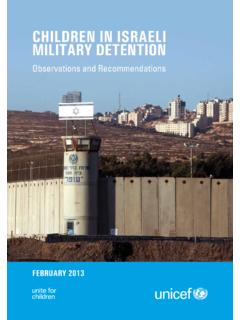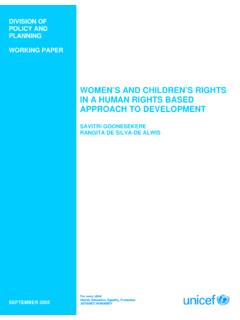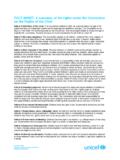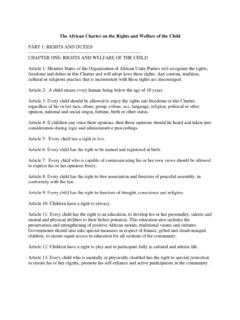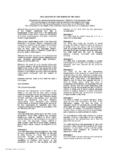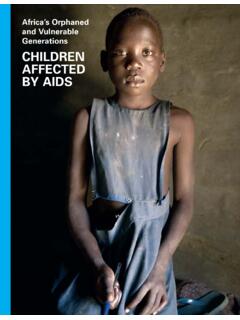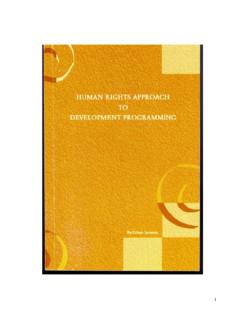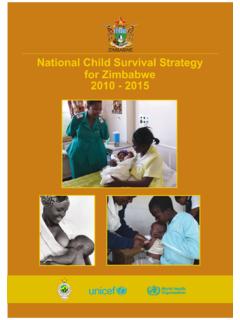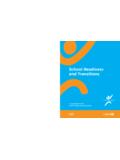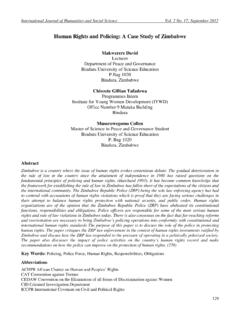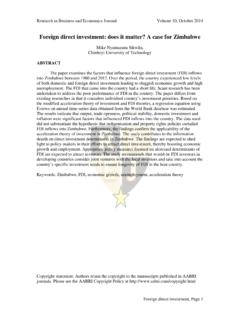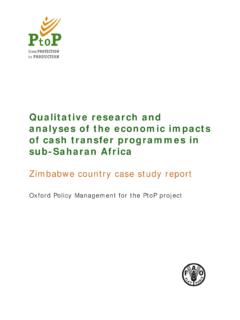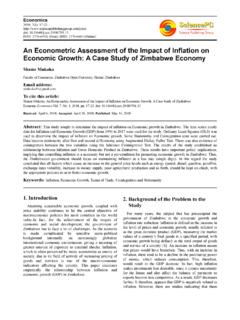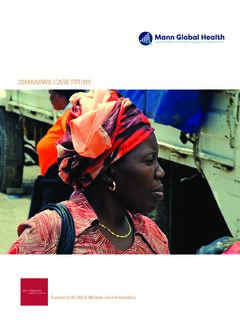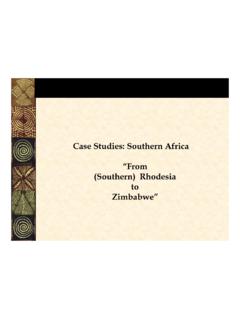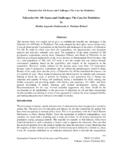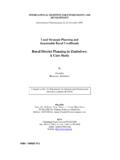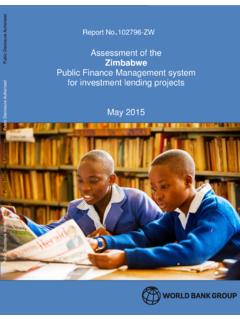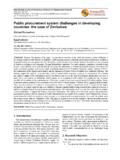Transcription of evaluation report - UNICEF
1 evaluation reportUnicef s Upstream Work in Basic education and Gender equality 2003-2012 July 2014cOUnTRY case study zimbabwe evaluation reportUnicef s Upstream Work in Basic education and Gender equality 2003-2012cOUnTRY case study zimbabwe country case study : ZimbabweivuniCeF s upstream Work in BasiC eduCation and Gender equality (2003-2012) country case study : zimbabwe United Nations Children s Fund, New York, 2014 United Nations Children s Fund Three United Nations Plaza New York, New York 10017 February 2014 The purpose of publishing evaluation reports produced by the UNICEF evaluation Office is to fulfil a corporate commitment to transparency through the publication of all completed evaluations.
2 The reports are designed to stimulate a free exchange of ideas among those interested in the topic and to assure those supporting the work of UNICEF that it rigor-ously examines its strategies, results, and overall effectiveness. The content of the report do not necessarily reflect the policies or views of text has not been edited to official publication standards and UNICEF accepts no responsibility for in this publication do not imply an opinion on the legal status of any country or territory, or of its authorities, or the delimitation of copyright for this report is held by the United Nations Children s Fund.
3 Permission is required to reprint/reproduce/photocopy or in any other way to cite or quote from this report in written form. UNICEF has a formal permission policy that requires a written request to be submitted. For non-commercial uses, the permission will normally be granted free of charge. Please write to the evaluation Office at the address below to initiate a permission request. For further information, please contact: evaluation Office United Nations Children s Fund Three United Nations Plaza New York, New York 10017 1 evaluation of UNICEF s Upstream Work in Basic Education and Gender EqualityTABLE OF CONTENTStaBle oF Contentspreface3acronyms and abbreviations 5acknowledgements6executive summary 7 CHapter 1 introduCtion reviewing UNICEF upstream work in education in zimbabwe evaluation Features 14 CHapter 2 UNICEF proGramme in zimbabwe national Context upstream Work by UNICEF in zimbabwe 21 CHapter 3 evaluation FindinGs the relevance of UNICEF s approach to upstream Work the results of UNICEF s upstream
4 Work internal Coherence of UNICEF s upstream Work in education external Coherence of UNICEF s upstream Work in education Factors explaining the results of UNICEF s upstream Work the sustainability of upstream Work 51 CHapter 4 ConClusions and lessons learned overall assessment lessons learned 56reference documents 58 country case study : Zimbabwe2anneXes 71annex 1 methodology 71annex 2 timeline of key education events at country level 2003 12 72annex 3: summary of Basic education indicators, public expenditure and aid Flows 2003 12 84annex 4 stakeholder map/list of people interviewed 85annex 5 upstream work in education 2003 12 88annex 6: theory of change interpreted for zimbabwe 94annex 7.
5 Summary evaluation matrix for zimbabwe CCs 95 BoxesBox Evidence on EMiS support and capacity development, and related research (extracts and summaries from UNICEF ZCO annual reports)37 FiguresFigure Foundation Theory of Change 17 Figure The Learning Cycle 46tablesTable zimbabwe : Selected indicators, 1990 2012 19 Table UNICEF zimbabwe , BEGE staff 2005 to 2013 30 Table Profiles of the Education Transition Funds i and ii 42 Table Overview of UNICEF zimbabwe s upstream work against DAC Criteria 2002 2012 553 evaluation of UNICEF s Upstream Work in Basic Education and Gender EqualitypreFaCeOver the past decade, UNICEF has placed increased emphasis on upstream support to national policy, capacity and partnerships to underpin and sustain scaled-up programme delivery.
6 UNICEF s work in the education sector has followed this approach, giving increased attention to upstream activities of this kind. Have these efforts been successful? This evaluation set out to provide an answer to this question by examining UNICEF s upstream work in basic education and gender equality in the period 2003 to 2012. At the global level, UNICEF s upstream education work entails engagement with governments and partner organizations to set the education policy agenda and leverage the resources required to achieve the goals of the Education For All (EFA) initiative and the Millennium Development Goals relating to education (MDGs 2 and 3).
7 At the national level, UNICEF contrib-utes to development of sector policies, strategies and programmes, and facil-itates the national dialogue on education policy and priorities. UNICEF also works with government and partners to mobilize funding sources within a sector-wide national programme framework and to strengthen capacities ensure proper allocation and management of purpose of the evaluation was to examine UNICEF s upstream work in education and assess the extent to which UNICEF has engaged strategically in education sector policy articulation and advocacy.
8 It also assessed how far upstream engagement efforts have supported better policy and practice in the education sector and helped to strengthen systems across the sector. The evaluation was executed in three phases: (i) an in-depth desk review of key concepts, trends and issues around upstream work in education, as well as a review of documents from 14 UNICEF country Offices; (ii) field-based case studies in Afghanistan, Brazil, Cambodia, and zimbabwe ; and, (iii) a survey among UNICEF country Office staff, key partners and professionals respon-sible for education evaluation found that UNICEF s global engagement in upstream work in education has indeed achieved results at the global and country levels.
9 But rather than pointing to the need to prioritise upstream work ahead of downstream work, the Zimbabwean experience was a good illustration of the complex interaction between downstream and upstream work. While upstream work (data and evidence, system design, policy, planning) was necessary for programming and programme implementation, involvement in downstream work and links with implementers provided the knowledge, experience, trust and credibility to enable effective participation in the upstream processes.
10 While the normal view is that policy should precede practice, practice was cleary indispensable for good policy making. Programming in the midst of a humanitarian crisis as was the case with zimbabwe , upstream work was necessary to ensure that appropriate downstream results can be achieved. PREFACEC ountry case study : Zimbabwe4 The evaluation was ably conducted by Mokoro Limited. On behalf of the evaluation Office, i would like to express my appreciation to Alta Folscher for her leadership of the evaluation and to the Mokoro case study team for zimbabwe consisting of John Kruger ( case study Leader), Anthea Gordon (Evaluator).
